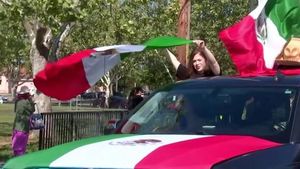Shares of major entertainment companies took a significant hit on Monday, May 5, 2025, as investors reacted to President Donald Trump's unexpected announcement of a proposed 100% tariff on foreign-produced films. The announcement has raised alarms about the potential impact on Hollywood, a sector already grappling with challenges posed by global tax incentives and shifting production locations.
At the opening of the U.S. stock market, Netflix's stock plummeted by 3.3%, while Disney saw a decline of 2.4%. Warner Bros. Discovery experienced a drop of 4.2%, and Paramount Global’s shares fell by 2.2%. These declines were notably steeper than the broader market indexes, with the S&P 500 down by 0.70% and the Nasdaq Composite down by 0.82%.
On Sunday, Trump took to his social media platform, Truth Social, to express his concerns regarding foreign incentives that attract filmmakers away from the United States. He wrote, "Other countries are offering all sorts of incentives to draw our filmmakers and studios away from the United States," labeling this a "concerted effort" that represents a "National Security threat." He authorized the Commerce Department and the U.S. Trade Representative to "immediately begin the process of instituting a 100% Tariff on any and all Movies coming into our Country that are produced in Foreign Lands."
This announcement blindsided the film industry, which had not anticipated such a drastic expansion of Trump's tariff policies beyond physical goods. The president's assertion that the American movie industry is "DYING a very fast death" has left Hollywood executives scrambling for clarity on how these tariffs would be implemented.
Economist Peter Schiff criticized the proposed tariffs, warning that they could lead to subscriber losses for streaming giants like Netflix. He stated, "This is a concerted effort by other Nations and, therefore, a National Security threat. It is, in addition to everything else, messaging and propaganda." The potential for significant losses in subscriptions has raised concerns among investors, particularly as companies like Netflix rely heavily on their international markets.
Trump's announcement comes at a time when the film industry is already facing challenges from international markets. In April 2025, China pledged to restrict Hollywood film imports in retaliation for tariff increases on Chinese goods. In the previous year, U.S. studios generated approximately $600 million from the Chinese market, highlighting the importance of maintaining good relations with foreign distributors.
Disney's Marvel movie "Thunderbolts" recently secured permission to debut in China on April 30, 2025, but the future of other summer blockbusters remains uncertain as tensions rise. The unpredictability of Trump's tariff policy has left many in the industry questioning whether it will apply to streaming services as well, further complicating the landscape for Hollywood.
As the movie industry navigates these turbulent waters, production has increasingly shifted to countries with favorable tax incentives. The British Film Institute reported that film and high-end TV production in the U.K. was worth £5.6 billion ($7.45 billion) in 2024, marking a 31% increase from the previous year. This trend has prompted major media companies like Netflix and Disney to film overseas in locations such as Canada and the U.K., where financial incentives are more attractive.
The Motion Picture Association's latest economic impact report indicated that the American movie industry boasted $22.6 billion in exports and a trade surplus of $15.3 billion in 2023. However, the potential for tariffs on foreign films could jeopardize this positive balance, as industry leaders remain in the dark about how the tariffs will be defined and enforced.
As of now, the specifics of Trump's proposed tariffs remain unclear. Questions abound regarding which films would be subject to these tariffs, particularly for productions filmed in multiple countries. For instance, Tom Cruise's upcoming film "Mission: Impossible – The Final Reckoning," primarily filmed in the U.K., is set to open on May 23, 2025. It remains uncertain whether this film will face new levies.
Furthermore, the impact of these tariffs could extend beyond films to television productions, raising further concerns for networks and streaming platforms alike. Mel Gibson, one of Trump's appointed Hollywood ambassadors, is currently planning to shoot a sequel to "Passion of the Christ" in Italy, highlighting the complexities of international film production.
With the global film industry expected to spend approximately $248 billion in 2025, as projected by Ampere Analysis, the stakes are high. Countries like Australia and New Zealand have expressed solidarity with their local industries, offering incentives to attract production. Disney has filmed many of its superhero movies in Australia, while the "Lord of the Rings" series was shot in New Zealand.
As the film industry braces for potential tariffs, executives are eager for clarification on the implications of Trump's announcement. The uncertainty surrounding the tariffs has created a ripple effect throughout the industry, impacting stock prices and raising questions about the future of film production and distribution.
In response to the announcement, Commerce Secretary Howard Lutnick commented on X, saying, "We’re on it," indicating that the administration is taking the matter seriously. However, until more details emerge, the future of Hollywood's relationship with international markets hangs in the balance.
As the situation develops, industry leaders and investors alike will be watching closely to see how these proposed tariffs will shape the landscape of American cinema and its global standing.





